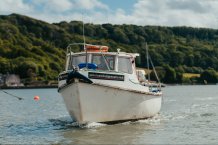
The Mermaid pre-conversion
Exeter plays pivotal role in developing UK’s first fully electric-powered domestic ferry
The University of Exeter will play a pivotal role in a pioneering project designed to develop the UK’s first fully electric-powered domestic ferry.
A consortium of engineering experts and businesses from across the West Country are collaborating on the ground-breaking project to create the innovative new vessel, called e-Voyager.
The project, which will begin in July, has now received a £105,500 grant through the Clean Maritime Call, a £1.4 million initiative from Maritime Research and Innovation UK (MarRI-UK) and supported by the Department for Transport (DfT), to boost the UK’s goal of zero emission shipping.
The University of Exeter have partnered with Plymouth Boat Trips, Voyager Marine, the University of Plymouth, Teignbridge Propellers and EV Parts UK, based in North Devon, to carry design and build the innovative sea-going, electric vessel.
The e-Voyager will offer clear environmental benefits, including using repurposed Nissan Leaf batteries to drastically reduce both noise and air pollution from the vessel. The motors, energy storage, control and charging systems will also be tested in a real-world environment, enabling the team to gain approval from regulatory bodies so they can be used in vessels across the sector and, eventually, carry passengers.
Initial work, which will take place at Voyager Marine, will focus on converting a conventional diesel boat to electric drive, using power from Lithium ion batteries.
Through the ERDF funded Marine Business Technology Centre, Brian Lambert, a University of Exeter Research Fellow will also help EV Parts UK to integrate and optimise the new electric power train – from the batteries to the motors, and perhaps to wireless charging of the boat in the future.
Brian said: “This project shows our commitment in reducing the GHG emissions in the UK and beyond, and in working with the Marine industry to develop new products and services.”
Professor Chris Smith, also from the University of Exeter added: “This will be the latest in a series of new electric-drive vehicles and vessels that we have helped bring into reality in the Centre for Future Clean Mobility.”
EV Parts will design the battery storage and motor installation for the vessel, using FBW (fly-by-wire) electronic controls to replace the existing systems. A team of scientists from the University of Plymouth, meanwhile, will carry out research during the build, measuring emissions including noise pollution, air pollution and fuel consumption.
Plymouth Boat Trips expect the e-Voyager to be out and about, alongside Plymouth Boat Trips’ existing boats including Cremyll Ferry, a busy commuter connection between Cornwall and Plymouth, later this year.
Announcing the recent grant recipients from the Clean Maritime Call, Kelly Tolhurst, Maritime Minister, said: “I’m delighted to see the diverse nature and scale of ambition shown by the winners of the Clean Maritime Call. Our vision is for the UK to be a world leader in zero-emission shipping and we will continue to support innovative projects, such as these, that aim to make our air cleaner and create a healthy environment for generations to come.”
John Howie MBE, Chair of MarRI-UK added: “These projects will play an important role in supporting the British maritime sector’s vision of zero-emission shipping and the UK Government’s Maritime 2050 strategy. It was encouraging to see such a high quality and large volume of responses, which made it all the harder to choose only ten project winners. The quality and quantity of submissions is a testimony to the commitment to continued development and innovation across the Maritime sector.”
Date: 8 June 2020
